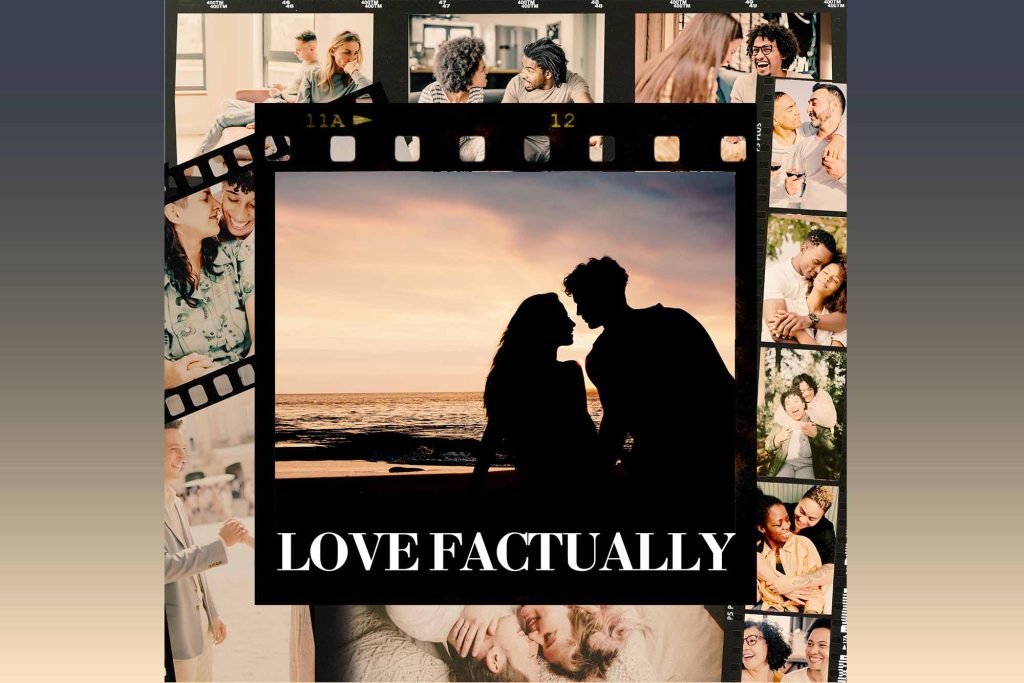Exploring the Science of Cocreating Relationships
Two APS members analyze films with a podcast focused on relationship science

Image above: Love Factually podcast artwork, provided by Paul Eastwick and Eli Finkel.
Two professors and social psychologists studying romantic relationships have set out on a new venture—creating a podcast for undergraduate students and the broader public focused on analyzing romantic films.
APS Fellow Eli Finkel (Professor, Northwestern University) and Janet Taylor Spence Award recipient Paul Eastwick (Professor, University of California, Davis) are experts on the inner workings of romantic relationships. Now, to help students retain the information they are learning in class, the two have taken to the mic to produce film-driven conversations about psychological science, politics, culture, and, of course, relationship research. The podcast, Love Factually, covers films from rom-coms to dramas, where the psychological scientists tease out messages about relationships that Hollywood injects into our culture.

The Observer interviewed the two on their research, the purpose of the podcast, and lessons to learn about romantic relationships. Read on to learn more.
Give us some background about yourselves and your research.
We’re social psychologists who study romantic relationships. The two of us arrived at Northwestern University in 2003 (Eli as a first-year professor, Paul as a first-year PhD student), and we started collaborating immediately. In the ensuing decades, our collaborations and friendship deepened. At least a few times per week, we time our exercise—Eli near Chicago, Paul in California—to talk on the phone about relationships, psychological science, politics, and culture. In a sense, each podcast episode is a hyper-efficient and hyper-focused version of those conversations, centered around one particular film.
Tell us about your podcast, Love Factually. What got you interested in the idea of using psychological science to analyze romantic films?
We had two primary motives, one personal and one professional. The personal motive is that we thought recording the podcast would be fun. We’re cinephiles who love thinking seriously about relationships, and we thought the podcast would afford the opportunity to explore the intersection of those interests—and, more broadly, the intersection of art and science.

The professional motive is that we thought the podcast could serve as a valuable outreach vehicle for relationship science. We’re proud to be associated with our academic discipline, and we’re chagrined by how much of the public discourse about relationships is uninformed by the evidence base. Our hope was that famous movies (When Harry Met Sally, Eternal Sunshine of the Spotless Mind, Challengers, etc.) could serve as Trojan horses for smuggling serious ideas and scientific evidence into the public discourse about relationships.
How would you define relationship science?
Relationship science is the study of close relationships—from the moment two people meet all the way through the aftermath of a breakup—using the scientific practices of observation, experimentation, and the sober evaluation of empirical evidence. As psychologists, we largely study how people subjectively experience their relationships, but relationship science also extends into related social science subfields, such as sociology, communications, and family studies.
You have both extensively researched relationship psychology. Are there any specific pieces of your research that coincide with romantic films?
Recording Season 1 was a blast in so many ways, but perhaps the best part was distilling the relationship-relevant ideas in each film, and then considering those ideas in light of the existing research. And yes, the films get lots of things right! Among the many examples: When Harry Met Sally illustrates the lengthy, unpredictable, and very common friends-to-lovers pathway, and Eternal Sunshine of the Spotless Mind illustrates the corrosiveness of treating a relationship partner with contempt.
Unfortunately, the films also get lots of things wrong. Perhaps the most pervasive example comes from 10 Things I Hate About You (and many other films), which treats high school as a place in which some people are universally desirable 10s and others are undateable 3s, a bleak vision of human mate value that is contradicted by the evidence. In reality, most of us can be a 10 in the right relationship. A second example, perhaps best illustrated by (500) Days of Summer, is that relationship partners are soulmates—that they are “meant to be.” We know from the science, including some of our own, that holding such beliefs is linked to relationship difficulties, especially in challenging times.
What would you like others to know about the ways love, attraction, and romance are played out in romantic films? What are the most common misconceptions that you’ve come across as social psychologists?
We decided early on to study a range of films, including classic rom-coms like When Harry Met Sally, teen comedies like Clueless, and serious cinema like Her or Portrait of a Lady on Fire. These films express a broad array of ideas about relationships; some are supported by the evidence, others … not so much. Season 1 of the podcast offers a bunch of takeaways, but perhaps the most essential is this: A relationship is something the partners cocreate. It isn’t something that can be distilled down to characteristics of the two partners—distilled down to something knowable in advance. In large part, it’s what the partners make of it.
Anything else you would like to add?
We’re using the podcast in our undergraduate classes. We’ve found throughout the years that students really retain the material when they see it depicted on screen in some capacity. What better way to illustrate the class concepts than to use a medium they would happily engage with in their free time anyway?
You can subscribe to the Love Factually podcast at: Apple, Spotify, or Episodes.fm.
Feedback on this article? Email apsobserver@psychologicalscience.org or login to comment.
Related content we think you’ll enjoy
-

Love and Attraction
Frank Sinatra crooned that they go together like a horse and carriage, but in truth love and marital health can falter over time. Scientists have identified a number of factors that sustain love through better or worse. Visit Page
-

Romance, Scent, and Sleep: The Stuff that Dreams Are Made Of
The scent of a romantic partner can improve your quality of sleep. This is true regardless of whether or not you are consciously aware that the scent is even present. [NEWS Feb. 13, 2020] Visit Page
-

Teaching: Are Romantic Relationships Actually Good for Mental Health?
Few psychologists realize that a potent risk factor for psychological disorders has been hiding in plain sight: people’s dissatisfaction with their current romantic relationship. Teach critical thinking about risk factors and relying on scientific evidence rather than intuition. Visit Page





APS regularly opens certain online articles for discussion on our website. Effective February 2021, you must be a logged-in APS member to post comments. By posting a comment, you agree to our Community Guidelines and the display of your profile information, including your name and affiliation. Any opinions, findings, conclusions, or recommendations present in article comments are those of the writers and do not necessarily reflect the views of APS or the article’s author. For more information, please see our Community Guidelines.
Please login with your APS account to comment.